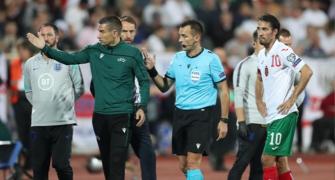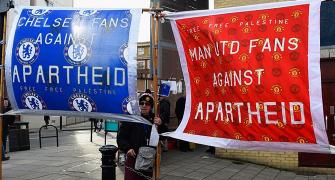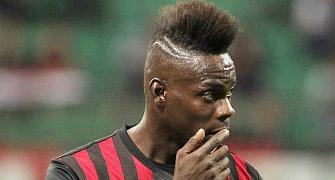Many former players believe that storming out of games is a powerful tool to counter racism, a move that will force administrators to take the problem more seriously, says Dhruv Munjal.
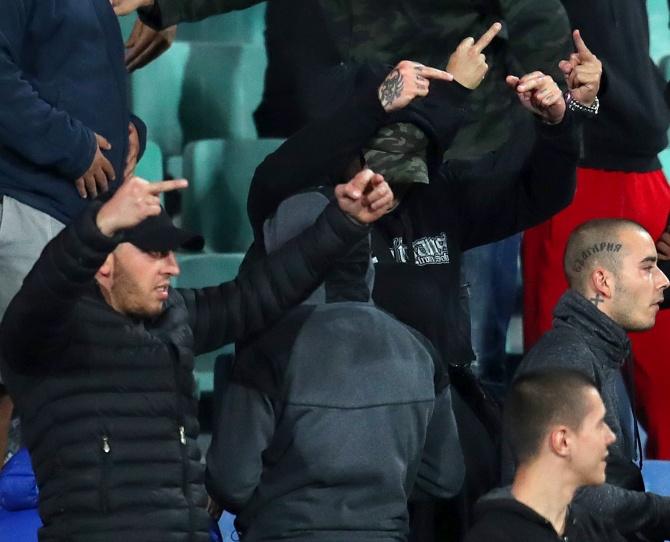
'This guy kills you in the one-on-ones. If you try to challenge him, you wind up on the floor. Either you have 10 bananas to eat, that you give to him, or...'
More than what was said, the most jarring part about these shockingly racist remarks made on Italian television in September was the immediate reaction they drew.
Instead of attracting horror, journalist Luciano Passirani's comments about Romelu Lukaku were met with ripples of laughter in the studio. Passirani later apologised, but was unable to save his job.
Some might still see the funny side of it -- mind you, there is none -- and try to pass it off as a form of harmless banter.
These are most likely the same people who defended the ultras -- a term used for fanatical football fans that originated in Italy -- when they directed monkey taunts at Inter Milan's Lukaku in a game against Cagliari earlier in September.
Or worse, the ones who came out in support of Bulgarian fans -- ostensibly from a 'hooligan firm' in Sofia -- who laid out Nazi salutes in the crowd during their team's Euro 2020 qualifier against England last month.
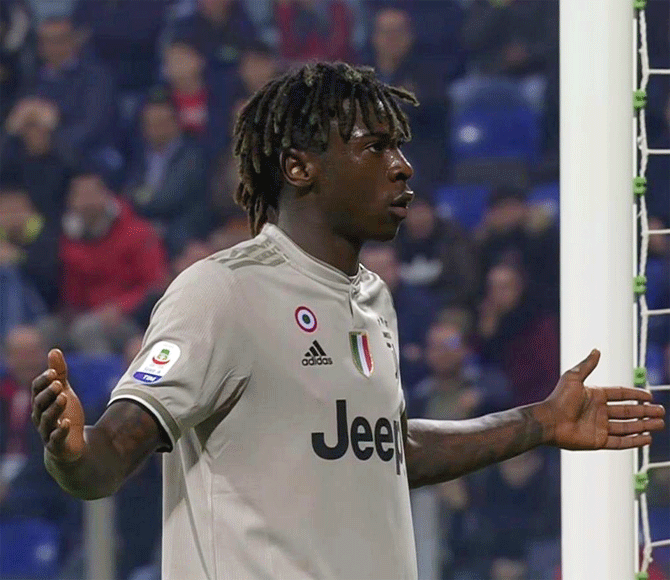
A part of the problem here is cultural -- Italy is notorious for ultras who unleash fascist imagery and racially provocative banners during games.
Many players of colour in the Serie A -- Kalidou Koulibaly, Blaise Matuidi, Sulley Muntari and Moise Kean -- have been subjected to racial discrimination in the past few seasons.
In Italy, such hooliganism has become so normalised that it is not uncommon for ultras from different clubs to defend each other in matters of racial abuse.
In Lukaku's case, his own supporters put out a statement backing Cagliari ultras that had targeted him. 'You have to understand that Italy is not like many other north European countries where racism is a REAL problem. In Italy, we use some 'ways' only to 'help our teams' and to try to make our opponents nervous, not for racism, but to mess them up,' the bizarre explanation read.
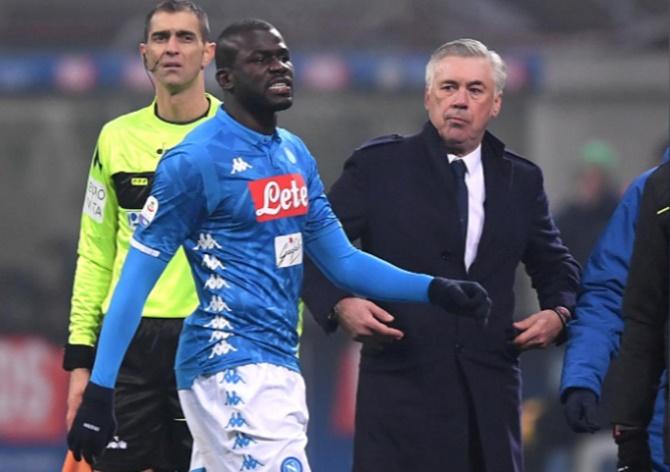
Not to mention the fact that the Italian players themselves have been accused of acting as apologists for xenophobic fans in the past.
Earlier this year, Juventus's Leonardo Bonucci was roundly criticised for suggesting that his team-mate Moise Kean was partially responsible for the abuse that was hurled at the latter by Cagliari fans, because of the incendiary manner in which he had celebrated after scoring against them. Bonucci later claimed that his comments were misunderstood.
Similarly, when Brescia's Mario Balotelli wanted to walk off after being at the receiving end of racial slurs against Verona, he was persuaded by everyone involved to stay on despite his very evident protests.
Many former players believe that storming out of games is a powerful tool to counter racism, a move that will force administrators to take the problem more seriously, and act in a way that compels clubs to obliterate such a culture and evict those responsible.
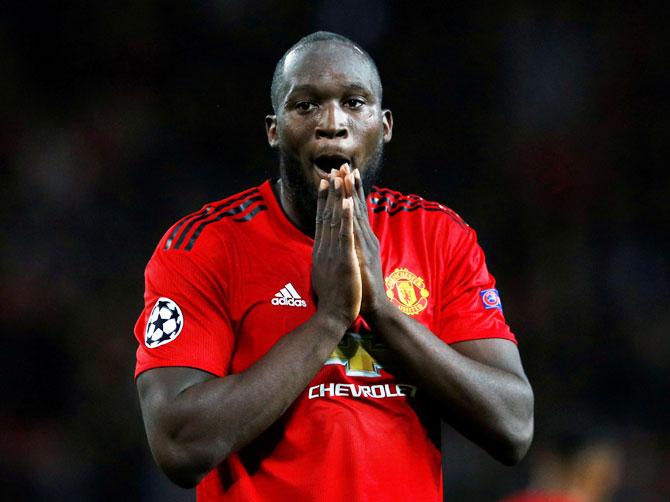
Balotelli, formerly of Manchester City and Liverpool, has been a staunch critic of the menace for many years, even claiming in a 2013 Sports Illustrated interview: 'You can't delete racism. It's like a cigarette. You can't stop smoking if you don't want to, and you can't stop racism if people don't want to.'
That this came from a former Italian international who represented the national team with some distinction is shattering to say the least.
All of this is perhaps exacerbated by how us observers and writers talk about players of colour -- betraying an unintended, casual racism that has been thriving for far too long now.
In a piece written in January, The Guardian's Sachin Nakrani wondered why the talents of Paul Pogba, the France and Manchester United midfielder, were always associated with 'pace and power'.
Pogba is an excellent technician, he noted, yet we seem obsessed with only his physical attributes. Come to think of it, that is how most midfielders of colour are described in the modern game.
Take Mousa Dembele, the former Tottenham midfielder who now plays in China. Dembele was a colossus in the middle of the park during his time at Spurs, combining terrific technical ability with unreal strength on the ball.
Despite his ability with ball at feet, very seldom was he appreciated for finesse or movement. To broadcasters, he was always a 'beast', or a 'monster' -- a player who could ram through teams like a lorry on turbocharge, when he was actually so much more.
In fact, most people asked to name a few white players blessed with 'pace and power' would probably struggle. Not because there aren't any, but because we never view them that way.

Such racial stereotyping has even led certain pundits to express doubt over some players' characters.
In early September, former Liverpool player Graeme Souness, working as an expert for Sky Sports, speculated that Juventus had sold Kean to Everton because the player's 'off-field activities weren't the best'.
At the time, Kean, only 19, was still adapting to the demands of a new league, and his performances until then had been expectedly mixed.
The issue here was not that Souness questioned his ability as a player, but that he spoke without proof, made an off-the-cuff remark that could have been avoided had he done his homework.
This is in no way to suggest that Souness is racist, but the racial undertones that emanated from his analysis were undeniable. More than anything else, it reflected a complete lack of sensitivity.
All this points to a greater malaise, one that can be fixed to a certain extent if the authorities start punishing the guilty more severely.
Uefa has toughened its stance on racism in recent times, but the measures just aren't stringent enough.
After the appalling scenes in Sofia, Bulgaria were fined 75,000 euros and asked to play their next home game, against the Czech Republic, behind closed doors. (Incidentally, a part of the stadium for their game against England was already cordoned off for previous racial abuse allegations.)
In Lukaku's case, Cagliari were fined for throwing bottles, but not charged at all for the racist abuse that the Belgian international received.
Some argue that the only way to take on far-right ultras is by awarding matches to the opposition, or by banishing teams from entire competitions -- steps Uefa deems to be excessive at this point in time.
The current Uefa protocol on dealing with racism involves three steps:
1. Stop the match and make an announcement asking fans to behave;
2, Make another announcement if the first one does not work, and suspend the game until the situation improves and;
3. Call the game off completely.
Despite the sanctions, matches are rarely abandoned -- most teams prefer to carry on in the name of 'sporting spirit' -- and the fines do little to deter football associations that already live in denial, and mostly fail to confront ultras.
Harsher punishments could be an answer, but for now what the game desperately needs is not only awareness, but also understanding and thought and care.
More minority managers and officials would be a decent place to start; so will properly educating people whose opinions shape -- and sometimes distort -- the very idea of the game we love watching.


